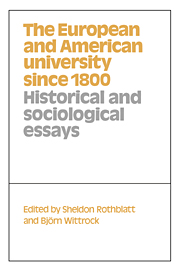Book contents
- Frontmatter
- Contents
- Notes on the contributors
- Introduction: universities and ‘higher education’
- Part I Fact and ideals in liberal education
- 1 The limbs of Osiris: liberal education in the English-speaking world
- 2 In search of Isis: general education in Germany and Sweden
- Part 2 The State, the university, and the professions
- Part 3 The ambiguities of university research in Sweden and the United States
- Part 4 Complexity
- Part 5 The ironies of university history
- Index
1 - The limbs of Osiris: liberal education in the English-speaking world
Published online by Cambridge University Press: 04 August 2010
- Frontmatter
- Contents
- Notes on the contributors
- Introduction: universities and ‘higher education’
- Part I Fact and ideals in liberal education
- 1 The limbs of Osiris: liberal education in the English-speaking world
- 2 In search of Isis: general education in Germany and Sweden
- Part 2 The State, the university, and the professions
- Part 3 The ambiguities of university research in Sweden and the United States
- Part 4 Complexity
- Part 5 The ironies of university history
- Index
Summary
In the following pages I do not pretend to enumerate and analyse all the alien elements which thus gathered round the popular deity. All that I shall attempt to do is to peel off these accretions and to exhibit the god, as far as possible, in his primitive simplicity.
Sir James George Frazer, The Golden Bough, 3rd edn (New York, 1935), II, 3.
A ‘primitive simplicity’
What may be possible in science, is not easily achieved in history. The ‘alien elements’ and ‘accretions’ are as important as the ‘primitive simplicity’, for it is in the elaboration of cultural forms and institutions that the human experience is captured, and it is within these forms, certainly as much as in the substance which they have been designed to promote, that argument and confusion arise. To the search for a ‘primitive simplicity’, therefore, the historian is justified in opposing a sophisticated complexity as a truer approximation of the labyrinthine decisions that take us from the deep past to the near present.
Yet such is the power of science and scientific conceptions of knowing, and the seductive power of logic, which joins fragments through language, that the desire to uncover a clear direction from the remarkable layers of historical time is understandable and possibly pardonable. It is certainly reasonable to expect that a Sir James Frazer, under the spell of late Victorian British rationalism, would want to find in the bones and limbs of ancient cults of dying and rising gods a simple identifiable clue that leads to Christian messianism and connects the centuries, one with the others.
- Type
- Chapter
- Information
- The European and American University since 1800 , pp. 19 - 73Publisher: Cambridge University PressPrint publication year: 1993
- 10
- Cited by



